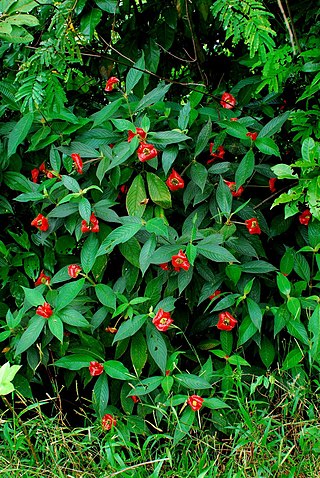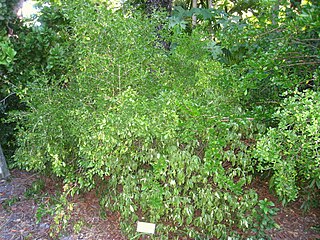
Rubiaceae is a family of flowering plants, commonly known as the coffee, madder, or bedstraw family. It consists of terrestrial trees, shrubs, lianas, or herbs that are recognizable by simple, opposite leaves with interpetiolar stipules and sympetalous actinomorphic flowers. The family contains about 14,100 species in about 580 genera, which makes it the fourth-largest angiosperm family. Rubiaceae has a cosmopolitan distribution; however, the largest species diversity is concentrated in the tropics and subtropics. Economically important genera include Coffea, the source of coffee; Cinchona, the source of the antimalarial alkaloid quinine; ornamental cultivars ; and historically some dye plants.

Psychotria viridis, also known as chacruna, chacrona, or chaqruy in the Quechua languages, is a perennial, shrubby flowering plant in the coffee family Rubiaceae. It is a close relative of Psychotria carthagenensis of Ecuador. It is commonly used as an ingredient of ayahuasca, a decoction with a long history of its entheogenic use and its status as a "plant teacher" among the Indigenous peoples of the Amazon rainforest.

Psychotria is a genus of flowering plants in the family Rubiaceae. It contains 1,645 species and is therefore one of the largest genera of flowering plants. The genus has a pantropical distribution and members of the genus are small understorey trees in tropical forests. Some species are endangered or facing extinction due to deforestation, especially species of central Africa and the Pacific.

Palicourea is a genus of flowering plants in the family Rubiaceae. It contains 694 species, which range from shrubs to small trees, and is distributed throughout the New World tropics.
Psychotria dura is a species of flowering plant in the family Rubiaceae. It is endemic to Jamaica.
Psychotria globicephala is a species of plant in the family Rubiaceae. It is native to Kerala and Tamil Nadu in India.
Psychotria grantii is a species of plant in the family Rubiaceae. It is a shrub or tree endemic to the island of Tahiti in the Society Islands of French Polynesia.
Psychotria hobdyi, the milolii kopiwai, Hobdy's wild-coffee or kopiko, is a species of plant in the family Rubiaceae. It is endemic to the Hawaiian Islands, where it is known only from the island of Kauai. There are about 10 populations for a total of about 120 individuals. It is threatened by habitat loss and was federally listed as an endangered species of the United States in 2010.
Psychotria speciosa is a species of plant in the family Rubiaceae. It is a shrub or tree endemic to the island of Tahiti in the Society Islands of French Polynesia.

Palicourea tomentosa, many synonyms, including Psychotria poeppigiana, is a plant species in the family Rubiaceae. A common name is sore-mouth bush, though it is not very often used.

Psychotria colorata is a species of plant in the family Rubiaceae. It has been documented in an ethnobotanical context among the Ka'apor people of Maranhão, Brazil by Dr. William Balée, the Tulane University anthropologist and historical ecologist:

Hodgkinsine is an alkaloid found in plants of the genus Psychotria, particularly Psychotria colorata, although it is also found in Psychotria lyciiflora and probably other species in this family,

Psychotria nervosa, also known as Seminole balsamo or wild coffee, is a shade tolerant medium-sized shrub native to Florida as well as the West Indies and Central and South America. It produces a "small, red, ellipsoid fruit" that resembles "the true coffee bean" in shape and attract birds. Its maximum height ranges from approximately 4–10 feet.

Psychotria ligustrifolia, the Bahama wild coffee, is a species of plant in the family Rubiaceae. It is native to Florida, Puerto Rico, and the Bahamas.
Myrsine linearifolia is a rare species of flowering plant in the primrose family known by the common name narrowleaf colicwood. It is endemic to Hawaii, where it is known only from the island of Kauai. There are 12 populations remaining, for a total of fewer than 200 plants. Like other Hawaiian Myrsine this plant is called kōlea. It is a federally listed threatened species of the United States.
Candidatus Caballeronia kirkii is a Gram-negative, non-fermenting bacterium from the genus Caballeronia and the family Burkholderiaceae. Ca. C. kirkii is an endosymbiont of the plant Psychotria kirkii, also known as Rubiaceae, and exists inside leaf and stem nodules.

Psychotrieae is a tribe of flowering plants in the family Rubiaceae and contains about 2114 species in 17 genera. Its representatives are found in the tropics and subtropics. Several genera are Myrmecophytes

Palicourea elata, formerly Psychotria elata, commonly known as girlfriend kiss and labios de puta, is a tropical plant that ranges from Central to South American rain forests in countries such as Mexico, Costa Rica, Ecuador, Panama, and Colombia.

Psychotria tenuifolia, commonly known as velvet-leaved wild coffee, is a species of plant in the family Rubiaceae. It is endemic to southern Florida, South America and the Caribbean. The description of velvet is based on the silky appearance that the leaves display in relation to other species of the same plant family.

Psychotria serpens, the creeping psychotria, is a species of flowering plant in the family Rubiaceae, native to Peninsula Malaysia, Southeast Asia, southeastern China, Hainan, Taiwan, the Ryukyu Islands, and central and southern Japan. A creeping or climbing perennial liana, it is typically found in thickets and forests, from 100 to 1,400 m above sea level. It is often substituted for "Caulis Trachelospermi" in traditional Chinese medicine preparations sold to people with cancer.











